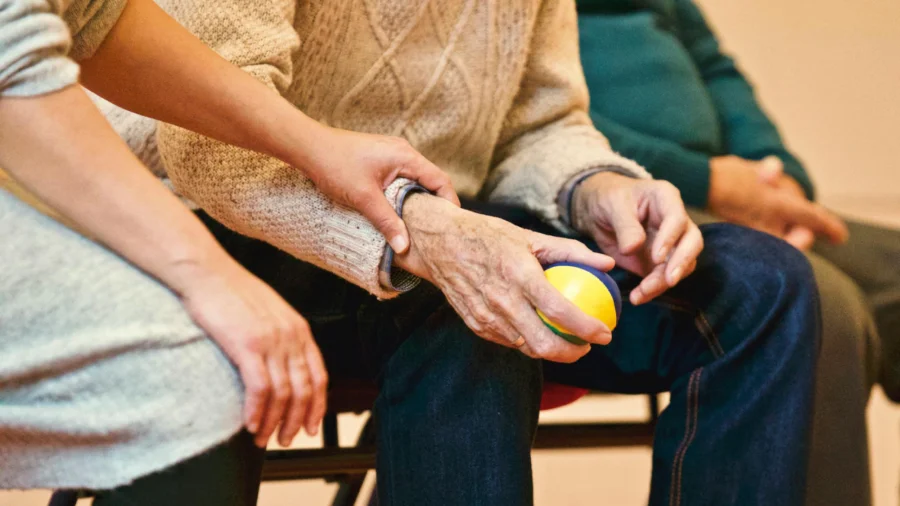Great care isn’t just about doing tasks for someone; it’s about helping them do what they can for themselves. Supporting your loved one’s independence wherever possible may make a huge difference in their day-to-day life.
From simple daily tasks to structured reablement plans, what your care workers do matters. The right care may help keep people secure, confident, and in control of their own lives.
In this article, we’ll explore the different ways care workers may help your loved one at home. This may help them to balance their independence with the support they deserve.
For more information on how we may support independence while meeting care needs, contact our team at myCare today.
Whether you’re navigating a recent hospital discharge or exploring reablement options, we’re here to help.

What are the Key Components of Care?
At myCare, delivering great care means more than simply providing assistance. It’s about supporting people to live comfortably and confidently in their own homes.
Every care plan is built on a few essential foundations that help us meet each person’s unique needs:
- Well-being
Keeping clients secure is always our top priority. From medication reminders to mobility support and personal care, we help reduce risks and provide peace of mind.
- Promoting Independence
Wherever possible, we encourage clients to take part in their own routines, whether that’s setting the table, getting dressed, or helping prepare a simple meal.
- Consistency and Routine
Familiar faces, regular visit times, and a steady routine help clients feel secure and reduce stress.
- Emotional Support
Good care includes a friendly chat, a listening ear, and genuine kindness. Our care workers are trained to support not only physical needs but also emotional well-being.
- Tailored, Person-centred Care
Every individual is different. We take the time to understand each client’s preferences, needs, and pace. We adapt care so it fits them, not the other way around.
- Clear Communication
We keep families informed, manage expectations around care visits, and work closely with loved ones. This is to help everyone feel confident in the care being provided.
Why Independence Matters
Independence plays a vital role in maintaining mental health, confidence, and overall well-being. When individuals are supported to do tasks for themselves, even in small ways, it fosters a sense of purpose, dignity, and control over their lives.
This helps reduce feelings of helplessness or frustration. Likewise, it also encourages daily engagement, boosts self-esteem, and supports cognitive function. This is particularly important for individuals living with conditions such as dementia.
Our Loved One’s Mental Health
As of 2022, nearly half of UK adults, approximately 25.99 million people, said they felt lonely at least occasionally, with some experiencing it frequently or all the time.
In many of these cases, the diagnosis included some form of anxiety or depression. The reasons may vary, but some common factors include a loss of freedom, fewer choices, and less connection with the community. These changes can have a big impact on well-being.
Helping loved ones not only stay physically healthy but also mentally well is crucial to their overall quality of life.

The Changing Care Culture
Over time, care has shifted from doing everything for someone to working with them, focusing on empowerment rather than dependence. Today, the goal is to help people stay active in their own routines and make meaningful choices.
Starting these conversations with loved ones early may help everyone feel more supported, understood, and involved in the care journey.
Self-directed support gives individuals more choice and control in a way that feels right for them. It also helps care meet both personal needs and contract requirements.
Balancing Routine and Choice
Routine provides comfort, stability, and a sense of control. Familiar patterns help reduce anxiety and make daily life feel more manageable. However, the need for choice and freedom within that structure is just as important.
Supporting a loved one means offering predictability while still allowing them to make their own decisions. They should be able to take part in daily tasks and feel that their preferences are respected.
The Difference With Tailored Support
Everyone’s needs are different, and so is the pace at which they feel comfortable. That’s why good care should always be flexible and person-centred. It needs to adapt to the individual rather than taking a one-size-fits-all approach.
At myCare, support is always tailored to the individual. We take the time to understand each person’s needs, preferences, and pace. We offer care that’s flexible, respectful, and truly person-centred.
Balancing Care and Funding
With local funding stretched and resources limited, care providers are under increasing pressure to do more with less. Balancing care contracts while still delivering meaningful support is a challenge many face.
At myCare, we support around 500 clients each week, and we understand how important it is to make every visit count. By focusing on tailored care, we help clients receive the support they want without sacrificing what they need.
What to Expect With Home Care
It’s important for families to know what care workers can realistically do. Standard visits are usually only 15 to 30 minutes long and will likely impact how they help.
While care workers offer valuable support, they aren’t there to complete all household tasks. Support may usually include:
- Medication prompts
- Light meal preparation or assistance with eating
- Personal care support (e.g. washing, dressing, grooming)
- Helping with mobility or getting in and out of bed
- Basic tidying or wiping down surfaces
- Assisting with laundry or folding clothes (where time allows)
- Encouraging involvement in daily routines (e.g. setting the table)
- Wellbeing check-ins and reassurance
- Short supervised walks or movement exercises (if suitable)
- Support with maintaining routine and structure
What is Reablement Support?
Sometimes care is not needed long-term. If your loved one has recently left the hospital, they may need extra support as they adjust back to everyday living.
Reablement, or enablement, focuses on helping people regain independence after a hospital stay. Often aligned with a six-week hospital reablement plan, this approach supports recovery at home.
At myCare, we work closely with clients to build confidence and daily routines, helping them get back to living independently.
Does My Loved One Need Reablement Care?
If your loved one tends to push through without asking for help, it can be hard to know when they need extra support. But if they’ve recently been in the hospital or are adjusting to a new condition, now might be the right time to check in.
A simple, open conversation can go a long way. If you’re unsure, here are some signs to look for that may suggest they could benefit from reablement care:
- They’ve recently been discharged from the hospital after surgery, illness, or injury
- They’re struggling with everyday tasks they used to manage independently
- Their confidence has noticeably declined when moving around or doing things for themselves
- They’ve experienced a fall or near-fall at home
- They seem withdrawn, anxious, or frustrated about their limitations
- Their physical strength, balance, or mobility has decreased
- They need short-term support to regain skills and routines
- You or other family members are stepping in more frequently to help complete basic tasks
- They want to remain independent but need structured support to do so
- A healthcare professional has recommended short-term, goal-based recovery support

How is myCare’s Support Different?
At myCare, our workers are carefully selected and thoroughly trained to provide more than just basic support. They’re there to build trust, encourage independence, and treat every individual with genuine respect and compassion.
Care isn’t just about age or experience; it’s about the right attitude, empathy, and a commitment to person-centred care. Our team is trained to involve clients in their daily routines wherever possible. Likewise, they adapt their approach with kindness and flexibility as needed.
This helps every visit feel supportive, empowering, and truly personal.
What if my Loved One Needs Additional Support?
In addition to standard care packages, myCare offers a range of private support options, each designed to provide extra flexibility and peace of mind.
These may include longer sessions, social care visits, and one-on-one support for outings, appointments, or even day trips.
For family members caring for a loved one full-time, we also offer respite services, giving care workers a much-needed break. This helps their loved one receive attentive, high-quality care.
Whether it’s extra help around the home, support after hospital discharge, or simply someone to provide companionship, our private care options may be tailored to suit your family’s unique needs.
Supporting Independence, Every Step of the way
Finding the right balance between support and independence may make all the difference in a loved one’s life. It’s not just about meeting physical needs; it’s about nurturing confidence, dignity, and a sense of purpose each day.
At myCare, we understand that every person’s journey is different. That’s why our team takes a thoughtful, personalised approach to home care. We strive to support individuals in a way that respects their independence, works within care plans, and brings families peace of mind.
If you’d like to learn more about how we may help your loved one live well at home, get in touch with our team today. We’re here to listen, guide, and support you every step of the way.





